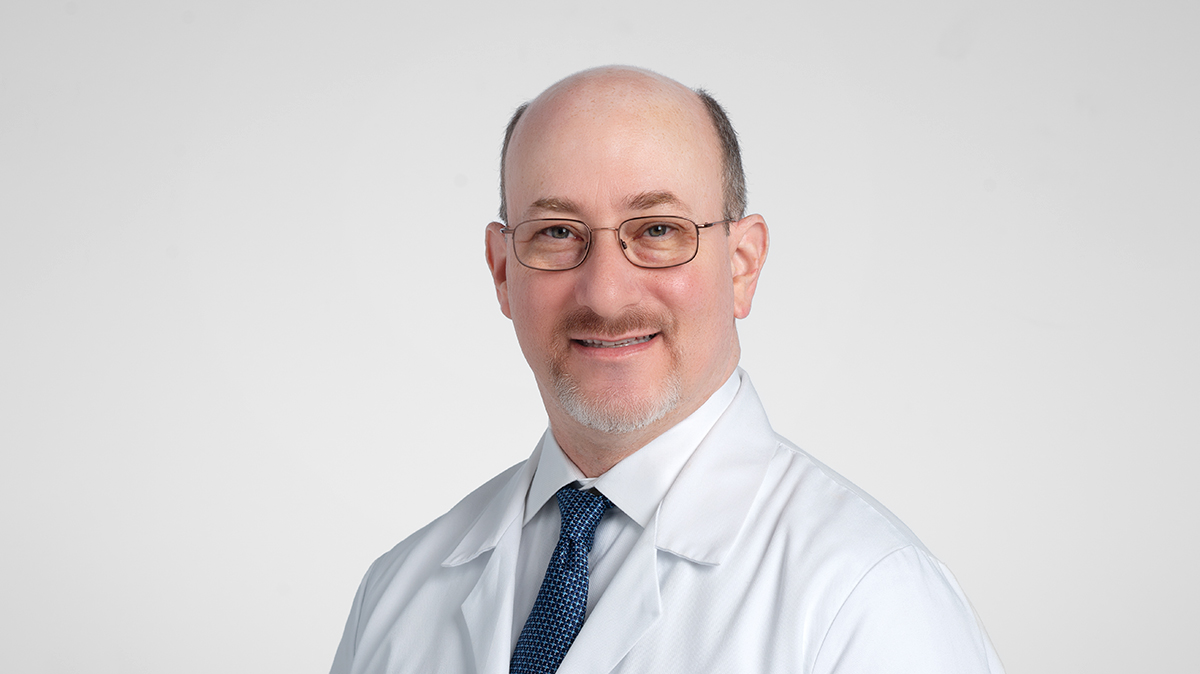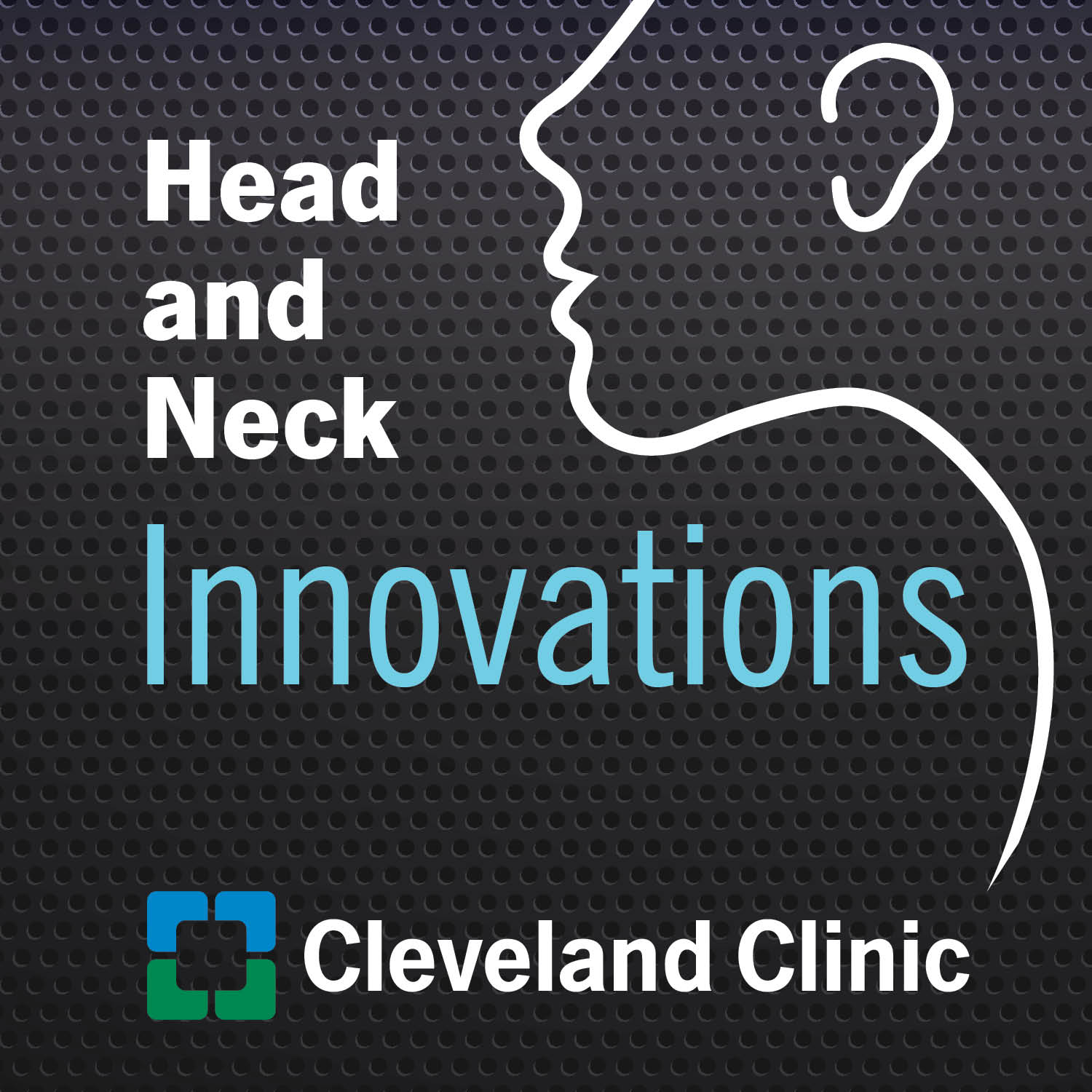Communicating with Confidence: Updates in Speech Language Pathology, Part I

Martin Brodsky, PhD, ScM, CCC-SLP, new Section Head of Speech Language Pathology, joins to discuss the ever-changing field of speech language pathology (SLP). Dr. Brodsky discusses research that he's participating in, as well as his goals for multidisciplinary SLP care at Cleveland Clinic.
Subscribe: Apple Podcasts | Spotify | Buzzsprout
Communicating with Confidence: Updates in Speech Language Pathology, Part I
Podcast Transcript
Paul Bryson: Welcome to Head and Neck Innovations, a Cleveland Clinic podcast for medical professionals exploring the latest innovations, discoveries, and surgical advances in otolaryngology, head and neck surgery.
Thanks for joining us for our new episode of Head and Neck Innovations. I'm your host, Paul Bryson, Director of the Cleveland Clinic Voice Center. You can follow me on Twitter @PaulCBryson, and you can get the latest updates from Cleveland Clinic Otolaryngology, Head and Neck Surgery by following at @CleClinicHNI. That's C-L-E clinic H-N-I.
Today, I am excited to welcome my new colleague, Dr. Martin Brodsky, our new Section Head of Speech Language Pathology here at Cleveland Clinic. You can follow him on Twitter @MBBrodskyPhD. Dr. Brodsky, welcome to Head and Neck Innovations and welcome to Cleveland Clinic.
Martin Brodsky: Thanks, Paul. Thanks for having me here. Pleasure to join you.
Paul Bryson: Well, let's start by having you share some background on yourself for our listeners. Where you're from, where you trained, and how you've come to Cleveland Clinic.
Martin Brodsky: Okay. Well, I grew up in the Detroit area and was turned on by the program at Michigan State where I completed my bachelor's and master's degrees in speech language pathology. Back then it was called audiology and speech science, so speech language pathology really wasn't in the title of the programs, nor was communication disorders back then. So I'm showing my age a little bit, I think. From there, I spent about four years doing my clinical fellowship. I spent a total of four years combined with clinical fellowship and the rest of my career before I went back for my PhD at the University of Pittsburgh. So I took the Ohio Turnpike, skipped over Ohio and went to Pittsburgh.
From there, about halfway through my PhD, I went to South Carolina, Medical University of South Carolina. I completed my PhD, my dissertation, down there. Had my very first job as an assistant professor down there. And about a year after I completed that work, I came up to Baltimore, Maryland, where I spent almost 15 years as an assistant turned associate professor of physical medicine and rehab. Still continuing to do speech language pathology work, and really getting into the research side of the field where I was funded on NIH grants and an FDA grant currently.
Paul Bryson: Congratulations on that.
Martin Brodsky: Thank you.
Paul Bryson: Can you share with the listeners, what was some that funded research? Just maybe in broad strokes, what were some of the topics and collaborations that you were working on there?
Martin Brodsky: Okay. The very first research that I did that I was funded on was a very small, almost pilot clinical trial of therapy during intubation to improve swallowing to the point where the patient isn't aspirating any longer, assuming they were aspirating in the first place. We never know what's happening during intubation, right? So that clinical trial, in fact, is just finishing up. We're cleaning the data right now, and hopefully we'll have some results in 2023 to present to everybody. Fingers crossed.
Paul Bryson: Yeah, it's very exciting work, and it's a difficult patient population. A very vulnerable group of patients that may be in the hospital for a long time, may require multi-specialty care, and then certainly require quite a bit of rehabilitative care on the backend as they complete their hospital journey. And as listeners have heard in the podcast previously, patients that have difficulties with swallowing and speaking and communication are sort of overlooked, and it's sort of a problem that isn't valued as much until it's compromised. And so research in that area is critical.
Martin Brodsky: That's exactly right, and one of the things that I've gotten into in my research is a little bit of the history of how we ended up where we are. This is more of a pastime, if you will, that as you read the literature and you try and follow the literature, I've always held the belief that you got to know where you were to know where you're going. It's real interesting where intubation started thousands of years ago, 4,000 years ago, but modern intubation actually only started about 70 years ago or 80 years ago. So really, we are in the infancy of knowing what's going on in the history of the world and the history of people, and it's very exciting to be on the fringes right now as things develop in its infancy, and trying to get into more of the toddler slash children side of things.
Paul Bryson: Now, it's fascinating. I wanted to ask, as you establish yourself here at the clinic and as you set the course with your colleagues in speech language pathology for how that section will grow and develop, what are some of the goals? What are some of the opportunities that you see as you start in this role?
Martin Brodsky: I think the first thing that really strikes me is the protocolization, the standardization for how we should be treating patients. Are we doing the same thing each time, every time to each patient that walks through the door? I think the better question is, should we? These are battles that certainly the academics of us try and battle out in our minds and with each other. I don't pretend to have any answers here. I'm asking a lot of questions, but I don't have a lot of answers. What I can say is that everything from the federal government to third party payers, to certainly the patients and the caregivers themselves, they want answers and they want to see more about outcomes. And I think the biggest trend that we're starting to see right now is that therapists, physicians, healthcare providers, broadly, are being pushed in this direction to provide outcomes. As well they should be, I think.
In some sense, what we've done is we've provided adequate information. I think certainly in 2023, we can provide better information, and I think the trend right now is really to get into objective measures, and with objectivity, you need standardization. You need protocols to get to that standardization. So it all plays together and it all works well for all of us, and hopefully the outcomes will follow.
Paul Bryson: Yeah, no, I think it helps us kind of establish what's valuable and necessary, and what maybe is less valuable or perhaps less necessary in certain situations. In broad strokes, there's a myriad of things and skills that speech language pathologists have and offer patients. As you look at your group and the things that we're offering in the Head and Neck Institute, can you share with the listeners some of the programs and things that we offer to patients?
Martin Brodsky: Sure, so we have a number of SLPs on steps, speech language, pathologists. I think we have about 14 spread across multiple sites. Most of them are on main campus between inpatient and outpatient settings, and we treat everything from pediatrics to adults into senescence. Effectively birth to senescence. If you have a problem with speech, language, voice or swallowing, we have an assessment and we hopefully have got a solution for that. Or at the very least, we have a good referral for you if we don't know the answers. A lot of good colleagues here.
Paul Bryson: A lot of good colleagues, and really a large, very important piece of the multidisciplinary team here. Obviously in laryngology, we work very closely with you and other colleagues, but can you share some of the other specialties you might interface with? I think for patients and sometimes even providers, they may not be aware that a speech language pathologist could offer quite a bit of value and treatment opportunity for patients.
Martin Brodsky: That's a really good question. Thanks for asking that. So on the inpatient side, any provider will come across the possibility of referring to speech language pathology, and I'll kind of go from the sublime to perhaps what may be the ridiculous, in examples. One of the more obvious ones would be the neurologist with patients who have stroke, head injury, progressive disease, or other neurological conditions that lead to difficulties with speech, language, cognition, voice, and swallowing.
The more ridiculous side, interestingly enough, we may end up on the obstetrics floor. And unfortunately you end up with, for example, mothers who have had a brain bleed during the act of pregnancy. Or we've had children who are having difficulties with speech and language, or perhaps voice and airway shortly after birth or even immediately following birth. So it really is, there's no provider in an inpatient area that would not recognize a speech language pathologist and the duties that they do.
Certainly, we spend a lot more time with neurology and orthopedics, physical medicine, laryngology or otolaryngology, head and neck surgery more broadly, and definitely medicine, general medicine, family medicine, internal medicine. But we've even seen a lot of patients, cardiac patients, specifically in the ICU, anesthesiology. Some of the pulmonary folks, interventional pulmonologists, find things that we need to pay attention to in the airway. So there's a lot of people on the inpatient side.
On the outpatient side, it gets a little bit more narrow in terms of how patients come in to see us. Still we have the big players of neurology and orthopedics, as well as general medicine, family medicine, certainly laryngology, we've had a number of referrals from our own clinic to each other. You don't see so much the oddities, if you will, of obstetrics and ophthalmology, that kind of thing. So they all exist on the inpatient, but it gets really narrow in the outpatient.
Paul Bryson: Yeah, I appreciate you elaborating on all the great collaborations that you can make, and I think people forget about some of those other encounters in the hospital setting where you have quite a bit to offer.
Martin Brodsky: Yeah, I'm looking forward, in fact, to meeting everybody on the inpatient side and getting to know the providers outside. I'm seeing outside referrals to my own clinics right now. It's a great opportunity to be here. It's a big institution with very large outreach, and I'm very excited to be here and learn more about it, and learn to help with the providers.
Paul Bryson: Dr. Brodsky, this has been a great discussion so far. I really appreciate sharing your journey to Cleveland Clinic with us and educating us on some of the many things that speech language pathologists can offer to improve patient care and outcomes. We'll pick this up again next time, and we'll talk a little bit more about some of your specific research interests.
For more information on speech language pathology at Cleveland Clinic, please visit clevelandclinic.org/speechtherapy. That's clevelandclinic.org/speechtherapy. And to speak with a specialist or submit a referral, please call 216.444.8500. That's 216.444.8500.
Dr. Brodsky, thanks for joining Head and Neck Innovations.
Thanks for listening to Head and Neck Innovations. You can find additional podcast episodes on our website at clevelandclinic.org\podcasts, or you can subscribe to the podcast on iTunes, Google Play, Spotify, SoundCloud, or wherever you listen to podcasts. Don't forget, you can access realtime updates from Cleveland Clinic experts in otolaryngology, head and neck surgery on our Consult QD website at consultqd.clevelandclinic.org/headandneck. Thank you for listening and join us again next time.



